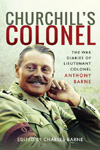|
CHURCHILL’S COLONEL
The War Diaries of
Lieutenant Colonel Anthony Barne
Edited by Charles Barne
|
 Charles Barne has endeavoured to do his grandfather, Colonel Tony Barne, justice by publishing his war diaries in which his changing views on Winston Churchill are recounted, from 10th May 1940 when he becomes Prime Minister, ‘A gentleman has gone and a clever cad has replaced him’ to 26th November 1944, ‘Wonderful man’. Tony Barne was an officer of The Royal Dragoons who was given command of the 4th Queen’s Own Hussars (4H), the Regiment into which Winston had been commissioned and of which, during Barne’s command, he was Colonel. Charles Barne has endeavoured to do his grandfather, Colonel Tony Barne, justice by publishing his war diaries in which his changing views on Winston Churchill are recounted, from 10th May 1940 when he becomes Prime Minister, ‘A gentleman has gone and a clever cad has replaced him’ to 26th November 1944, ‘Wonderful man’. Tony Barne was an officer of The Royal Dragoons who was given command of the 4th Queen’s Own Hussars (4H), the Regiment into which Winston had been commissioned and of which, during Barne’s command, he was Colonel.
These diaries are one man’s personal account of his war and some of the characters with whom he spent it, whether soldiers, commanders, friends, or relations. His writing also reflects some of the social attitudes, some definitively politically incorrect, of his generation. While they give some impression of war in the desert and later in Italy, the interaction of The Royal Dragoons with other units is only superficially touched on. This is disappointing since they took part in some of the defining battles of the North African campaign, if not the war and a further disappointment is the absence of maps showing The Royals’ position on the ground at various key moments and how they related to other units and formations. Without this detail it is hard to follow events accurately. The same applies to Barne’s time in Italy in command of 4H although he describes vividly the shocking effect on his regiment of repeated order, counter-order, and disorder, from senior commanders and their inability, in his view, to plan decisively to overrun the Germans as they retreated.
However, his war is really the backdrop to him trying to manage two things, his very happy marriage (he and his wife, Cara, spent the first couple of years together in Cairo) and trying to forge his career in The Royals. His approach is slightly ambivalent when in May 1940 he writes that he wishes he could get away from Cairo ‘but there has to be an army here and it would be cruel on Cara’. By November 1941, ‘I can’t remain in this life of luxury while my friends are being sacrificed for me’. His chief professional test comes when the Commanding Officer, Lieutenant Colonel Tony Pepys, does not recommend him for command which is complicated when Barne becomes an acting Lieutenant Colonel in November 1942. Pepys is evacuated as a casualty and on 18th January 1943 the new Commanding Officer, Lieutenant Colonel Humphrey Lloyd, arrives just over three weeks after Christmas Day, when Barne wears ‘my colonel’s badge for the first time’. Later he has sufficient insight to write, ‘It’s clear I’m a disturbing influence...’ and he spends the rest of the diary regretting not getting command. So in April 1945, ‘I could not be happier, unless perhaps I commanded the Royals…’ and in June 1945 ‘…it would be the wisest course to remain [CO 4H] – I’ll never command the Royals now’. In his Epilogue, Charles Barne very honestly says that his grandfather ‘must carry some of the responsibility of not trying to find a way to work with [his Commanding Officer]’.
Barne records all his meetings and communications with Churchill without much elaboration, including what Charles Barne calls ‘his infuriatingly brief account of lunch alone with the Churchills’. However, the diaries are written in a short form where references to people are frequently by first name only without explaining their significance or context. Mentions of incidents are oblique or even tangential, and impossible to tie in to specific events or battles e.g. the Battle of Bologna. One could form the impression that these diaries were not written with publication in mind but as a form of prompt to their author, and the fact that Barne published his own memoirs in his lifetime, no doubt drawing on the diaries, bears this out.
It is disappointing that from the outset there are many errors of fact and inaccuracies (e.g. SSM is a not a Staff but a Squadron Sergeant Major and the LAD is detached from rather than attached to the REME); and there are too many printing errors which are distracting. Nevertheless, this was one man’s personal account of his war and the several battles he was fighting internally. As Barne summed up in May 1945, ‘I’ve neither done anything cowardly nor been altogether a failure on movement control or in G-plans or as a squadron leader or as a regimental commander. I’ve certainly had as much fun out of these 5½ years as anyone could have in wartime….’
Hamon Massey
Pen & Sword (2019)
|
|